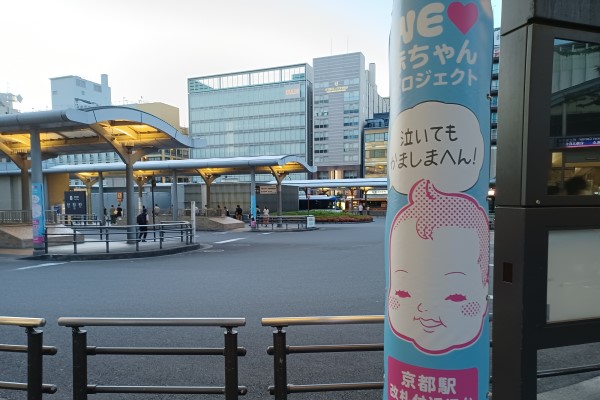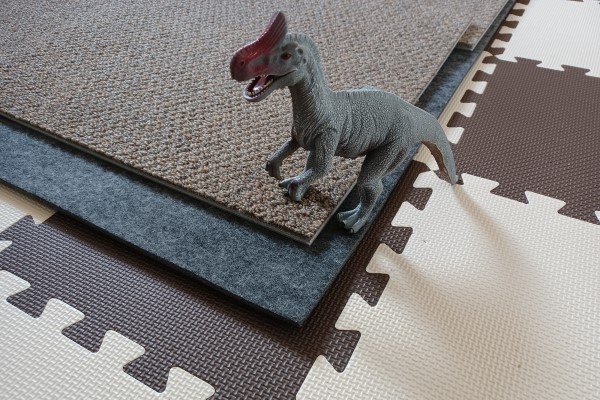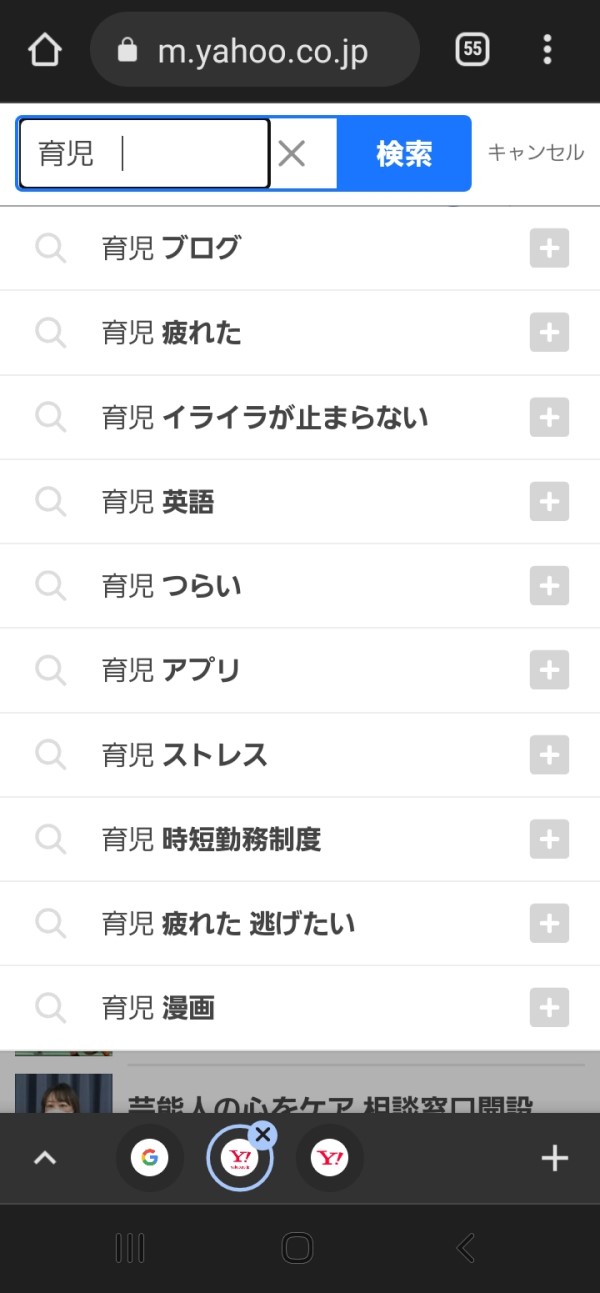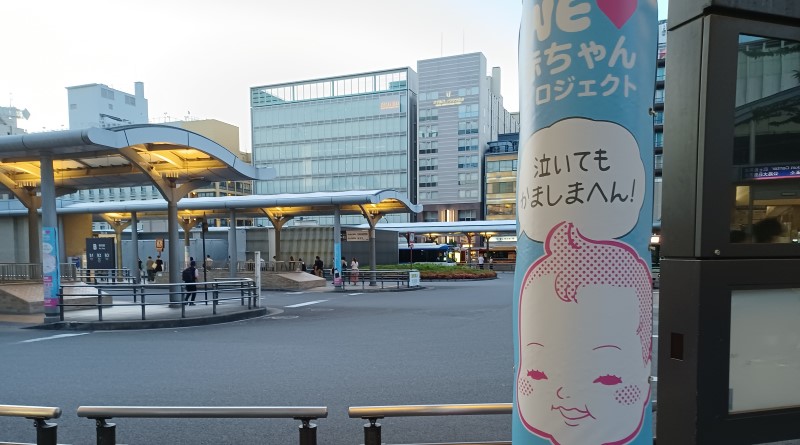[ad_1]
The dwindling number of children in Japan is a serious issue, for without any children a country has no future. One might assume then, that this would make the children Japan does have all that more precious. It stands to reason that Japanese people would be excited at the prospect of new schools and the sound of children at play. Unfortunately, it does not seem this is the case. Rather in our experience, people are showing less tolerance for kids and kids are gradually becoming a nuisance to many Japanese people.
In 2019 we welcomed our own son to the world. He is a bright, spirited, and kind-hearted boy. He was born in the United States and after a year and with much difficulty due to the pandemic, our family was reunited in Japan*. As we all adjusted to our new life as a family together one realization soon became impossible to ignore; It is simply really hard to live with kids in Japan.
* Our year of separation and our reunion is a saga in and of itself. If there is enough interest, we will tell that story another time.
Japan’s Dwindling Birth-rate
Before talking about raising kids in Japan, let us explain Japan’s dire birth-rate crisis.
Japan currently has 14,930,000 children (under 15 years old). This accounts for 11.9% of the entire population, which is actually the lowest ratio of children to adults in a country in the world. Japan’s birth rate has been on a 48-year decline. Today the number of babies in the country is almost half the number of babies born in 1954.
You might think maybe the Japanese choose not to have kids because the Japanese government doesn’t provide enough resources for new parents. But let me tell you it is not true at all. The Japanese government does offer ample support for raising kids, at least financial support. For example, the Japanese government gives 410,000 yen (almost $4,500) when you give birth to a kid. This money in effect covers the entire cost of labor and delivery. Pregnancy checkups are not covered by national health insurance, but cities will give expectant mothers coupons that essentially cover those fees. In short, as long as it is a normal healthy pregnancy and delivery—there is minimal to no cost.

Even after the birth, a lot of financial support awaits you. Mothers and fathers can take parental leave for a year and 50 to 67% of their salary will be paid during this leave (80 percent of mothers and 10 percent of fathers take this parental leave according to the Ministry of Health, Labor and Welfare). Kids do not have to pay any medical expenses until they hit 15 (or sometimes 12. It depends on your city) and parents can get 15,000 yen child support every month per a kid until they hit 15 years old(10000 yen after 3 years old). Despite all this financial aid, however, the birth rate is still taking a nosedive. Every year fewer and fewer children are born. Why?
The Japanese government suggests that the reason for this is probably because of the late marriage or a higher percentage of unmarried people. Indeed, Japanese train stations are covered with ads for online dating sites to find a mate, and there are plenty of wedding chapels that run aggressive campaigns. But I think there is another crucial reason why Japanese people hesitate to have a baby.
Kids are annoying
Meiwaku
I think the crucial reason why people do not want to have kids in this country is that it is simply hard to raise kids in Japan. More and more, people are not tolerant with kids and people increasingly think kids are nothing but meiwaku or a nuisance in English. Who wants to be a nuisance!
Being a nuisance is the last thing you want in Japan. Once you walk in a Japanese town, you can find many signs apologizing for all sorts of minor irritations.

Mind Your Manners!
All those things that might cause a nuisance to other people are strictly prohibited. In order to not be a nuisance to those around you, people constantly tell you it is important to follow manners in Japan. It is almost alarming how much the Japanese focus on manners. There are even professional lectures on manners! Naturally, Japanese parents first and foremost, teach their children to follow manners so that they will not be a nuisance to other people. But as anyone who has ever spent a day with a baby or toddler can tell you, this is practically impossible for young children to understand.
Of course, what is a nuisance to one person isn’t a bother to another. To be honest there are a lot of things that fall into a sort of “gray zone” when it comes to manners. Some people think it is annoying for someone to talk with friends on trains and some do not. Kids are now definitely part of this gray zone or maybe more like a nuisance as the number of kids dwindles.
Transportation Hell
Another example is even part of the daily commute. When you ride the train in Japan, the train conductor always says over the PA “please refrain from talking on your phone as it is a nuisance to those around you.”
In fact, most Japanese people cannot stand other people talking on their phones on the train. It is hardly surprising then, that Japanese people think kids are too noisy. No wonder they mind kids playing or talking cheerfully in a loud voice! There are even several incidents where local people were against building a new nursery school in their neighborhood because they didn’t want the disturbance.
The prime example of kids being a nuisance to people takes place outside, especially when you take trains. Japan has a wonderful system of trains and it is so convenient, so many people use them. Also, many kids love to ride trains.

However, taking the train can be a nightmare for parents. For example, there are plenty of people who complain people should never use strollers on trains or at least fold them. People constantly discuss the best manners for parents on trains. Some people even say babies and toddlers shouldn’t use trains. At least almost everybody agrees that parents have to follow “manners” if they want to take the train with their children. (If you think this is too much, on Tokaido Shinkansen, there is a special car reserved for parents with kids so that they don’t have to worry too much)
The most famous and traditional train book in Japan “Tetsudo Journal, or Railway Journal” (reprinted in Toyo Keizai Online) talks about the manners in trains and describes parents with kids that “most parents crouch in the corner of the trains and focus all their attention on their kid’s behavior, in order not to be a nuisance to those around them”. But this magazine goes on to say “Parents should try their best not to be a nuisance to other people. Because kids are often a nuisance to people, parents should accept it if they experience someone irrationally yelling “Shut up!” at their kids even though their kids are just talking”.
“We Love Babies”
Mr. Komazaki Hiroki, Japan’s biggest advocate of fatherly involvement in child-rearing and a member of the Children and Child-raising Committee, states in President (one of the most famous business magazines in Japan) that “the difficulties of raising kids are not just limited to the household. There are more and more people, except those who are parents themselves, who consider the existence of children annoying.” His analysis as to why this happens in Japan is that “because there are fewer opportunities of hearing kids’ voice, people think their voice or sound unfamiliar and thus annoying. ”
Not everyone feels this way though. There is a special project called “We Love Babies” and several Japanese prefectures, including Kyoto, participate in it. In this project, you can get a special sticker to show that you do not care if babies cry in public places. I think it is a wonderful project because it helps create a safe, welcoming atmosphere for parents. However, this project proves that there are plenty of people who can’t stand crying babies.

The Grocery Store
During the height of the COVID pandemic, a segment on NHK focused on the topic “Is it a nuisance to take kids to the supermarket?” and surprisingly many people think it is. NHK concluded this discussion by introducing a whole list of manners parents should follow when they go shopping with their kids. We have also personally experienced the sheer panic of our son simply being fussy in the grocery store in Japan. While in America, most people just rolled their eyes or even tried to help calm him down. However, in Japan, the quiet looming tension and sideways glances, create an unspoken air of “what is wrong with you people?” Many times, this discomfort could send us practically running out of the store.
You might think we are just being too sensitive, but Japanese society places a very heavy expectation on people to behave in an appropriate manner. In fact, the demand society places on parents specifically to force their children to mind is so strong that it is not uncommon (and even considered acceptable) for parents to strike their children. According to NGO Save the Children Japan and NHK, 70%-50% of Japanese parents actually hit their children and 40% of parents think it is ok to do so*.
*We adamantly do not share this belief and do not hit our child. We are more likely to be hurt by him (biting, slapping, kicking, head butting, etc…) than he is by us.
It is unreasonably hard to raise kids in Japan
As parents raised in Japan, we are also having a hard time. Because our neighbors complained about noise in our apartment, the apartment company assumed it is us since we have a toddler. This forced us to spend more than a thousand dollars to soundproof the apartment. We always pay all attention to our kids when we ride the train and never ride during rush hours. However frankly this life of constantly worrying about whether our kid is bothering someone else, is not enjoyable.

Some people may think we are just not good at parenting and criticize Japan for no reason. But according to the 2021 Japan Census, 60% of Japanese people say it is hard to raise kids in Japan. The most established magazine for mothers, “Tamahiyo”, reports that 70% of mothers think they feel it is hard to give birth and raise kids in Japan. The most common reason for this was financial, but the third most common reason was less tolerance of the society. So at least we are the majority. I believe.
Many experts agree that raising kids in Japan is very hard and parents are under extreme social pressure. Professor Oohinata, Developmental Psychologist and the Dean at Keisen University, says parents are socially vulnerable and that “I hope people shouldn’t bully parents (who are socially vulnerable) with kids (also vulnerable) anymore.”

It is interesting to mention here that the Cabinet Office Interviewed 100 Japanese parents who had raised kids overseas and concluded that the biggest difference between Japan and foreign countries is that, unlike Japan, people in foreign countries are nice to parents with kids and people are actually more likely to help them.
None of this is to imply that any rearing methods in one culture are superior to another. We never meant to say Japanese people should just follow the way to raise a kid in Western countries. Yet when parents within a culture consistently report they face tremendous struggles simply trying to allow their children to be part of that society, something is amiss. It is clear this is a very complex multi-pronged socio-cultural problem and there are no clear solutions.
But for now, all we can definitively say is that it is just unreasonably hard to raise kids in Japan.
Work Cited List
落合恵美子. 2018. 現代ビジネス. “日本はなぜ子育てが世界一難しい国になったか?50年で変わったこと” https://gendai.ismedia.jp/articles/-/55108?imp=0
駒崎弘樹. 2021. President. “「子育てに冷たい日本社会はダメだ」と愚痴るだけで済ませる大問題” https://president.jp/articles/-/47693?page=1
竹下郁子. 2019. Business Insider. “悪化する「子連れヘイト」。駅でベビーカーを蹴られ、SNSの#放置子#道路族で追い詰められる母親たち” https://www.businessinsider.jp/amp/post-199568
鍋倉紀子. 2016. 東洋経済オンライン. “電車内の「ベビーカー問題」は解決できるのか” https://toyokeizai.net/articles/-/136072?page=3
マイナビニュース. 2018. “7割の親が「子供をたたいたことがある」イライラ感じる人ほど頻度高く” https://news.mynavi.jp/article/20180215-585081/
セーブ・ザ・チルドレン・ジャパン. 2021.「子供の体やこころを傷つける罰のない社会を目指して」
AMP News. 2021. “今の日本は「産み育てにくい環境」約7割の母親が実感 約2000人を対象に「たまひよ」が調査” https://ampmedia.jp/2021/02/16/benesse0216/amp/
Miki House 出産準備サイト. 2021. “日本が「子育てしづらい」のは、育児負担が親にかかりすぎているから?“ https://baby.mikihouse.co.jp/information/post-15330.html
NHK すくすく情報子育て. 2020. “子どもの虐待を考える②”~たたく子育て どうすればやめられる?~ https://www.nhk.or.jp/sukusuku/p2019/805.html
NHK 生活情報ブログ. 2021. “子供とスーパー、ダメなの? 新型コロナ” https://www.nhk.or.jp/seikatsu-blog/400/442794.html
J-Cast ニュース. 2016. “宇多田ヒカル「東京は子育てしにくそう」「ベビーカーに嫌な顔」日本人は冷たい?” https://www.j-cast.com/2016/10/25281743.html?p=all
厚生労働省. 2020. “育児休暇取得率の推移” https://www.mhlw.go.jp/stf/wp/hakusyo/kousei/19/backdata/02-01-08-01.html
総務局統計省 . 2021. “統計トピックスNo.128” https://www.stat.go.jp/data/jinsui/topics/topi1281.html
内閣府政策統括官(共生社会政策担当). 2009. “子育てしやすい環境、製品・サービス、手法を海外から学ぶ ~海外で子育て経験のあるパパ・ママ、100人インタビュー結果~”
内閣府. 2004. “第2章 なぜ少子化が進行しているのか” https://www8.cao.go.jp/shoushi/shoushika/whitepaper/measures/w-2004/html_h/html/g1210000.html
内閣府. 2006. “第2章 子供の数” https://www8.cao.go.jp/shoushi/shoushika/whitepaper/measures/w-2006/18webhonpen/html/i1121100.html
[ad_2]
Source link

